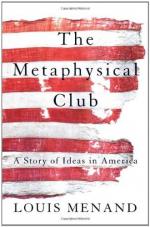
|
| Name: _________________________ | Period: ___________________ |
This test consists of 5 short answer questions, 10 short essay questions, and 1 (of 3) essay topics.
Short Answer Questions
1. James felt that pragmatism was the philosophy of __________.
2. Modern societies are led by ________ and the procedures and theories that led to modernity.
3. When cultures define themselves, the eventually need to be ____________.
4. In 1918 a new political party called _________ was created by Melusina Fay Pierce.
5. When Dewey's appointment for principal was withdrawn he left the university to go to __________.
Short Essay Questions
1. What was the theory put forth by Holmes' lecture series, "The Common Law?"
2. Why was Pierce fired from his job at Johns Hopkins University around January of 1884?
3. Why did the new theory of cultural pluralism seem to foster prejudice and discrimination?
4. When Charles Pierce arrived at the school, what did he announce he was going to revive?
5. Why was the fourteenth amendment added to the Constitution after the Civil War?
6. Why did Kallen give up his religion at first, though he ended up returning later on?
7. What was the greatest achievement of Holmes which occurred before he was 40 years old?
8. What was the new requirement of all students who enrolled in Harvard Professional Schools?
9. What was never the intention of the American Association of University Professors though it ended up being the case anyway?
10. What are modern societies led by, according to the studies of Holmes?
Essay Topics
Write an essay for ONE of the following topics:
Essay Topic 1
The inequality of races was something many scientists set out to prove during the early days of America.
Part 1: Why do you think other races were immediately seen as being inferior?
Part 2: Do you think it's fair to start a scientific discussion with an answer already in mind? Why or why not?
Part 3: Do you think people still believe that races and the genetics of different races lead to inequality or the presumed superiority of whites? Why or why not?
Essay Topic 2
It is curious that the main characters in this story are men and that the great thoughts of America seem to come only from men.
Part 1: Why do you think this book focused on the ideas of men rather than including more women thinkers?
Part 2: Why do you think women were unable to become a part of the Metaphysical Club?
Part 3: Do you think the author believes women did not contribute anything of value at this time? Why or why not?
Essay Topic 3
Morris was trying to decide how to reconcile science and faith in his own mind - a popular topic of discussion and study.
Part 1: Why do you think faith and science have a difficult time 'getting along' in terms of their ideas?
Part 2: Do you think that faith and science have common ground? Why or why not?
Part 3: Can science and father ever be reconciled? Why or why not?
|
This section contains 690 words (approx. 3 pages at 300 words per page) |

|




